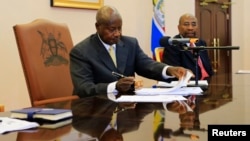WASHINGTON —
The United States on Thursday canceled a regional military exercise in Uganda, imposed visa restrictions, diverted funds for a health institute to another country and cut funding for a Ugandan police program in response to a law that imposes harsh penalties for homosexuality.
Senior U.S. administration officials, speaking before the announcement by the White House, said the stepped up measures were carefully targeted at those responsible for abuses related to implementation of the anti-gay law and involved in corruption.
The officials said the steps would not directly impact HIV/AIDS and food programs that benefit ordinary Ugandans.
“The idea is to send a signal to perpetrators and would-be perpetrators that we are indeed monitoring, that we are indeed prepared to take measures, and that there are consequences,” a senior administration official told Reuters.
President Barack Obama had warned Museveni at the time that the law would complicate relations between the two countries. Since then, the United States has been reviewing its funding to Uganda, while privately pressing Museveni's government to repeal the law.
Ugandan Foreign Minister Sam Kutesa was in Washington last week meeting with U.S. Secretary of State John Kerry to discuss American concerns about the law, which imposes life imprisonment for those engaging in homosexual sex.
Washington has been careful in its retaliation not to divert funding from projects that will directly affect HIV/AIDS or nutritional programs that benefit ordinary Ugandans.
Uganda is also a key Western ally in the fight against Islamic extremism in Somalia, where Ugandan troops form the backbone of the African Union force battling al-Qaida-aligned militants.
Western donors, including the United States, have already halted or re-directed about $118 million in aid to the East African nation's economy, although steps so far have had limited impact on the budget, in part because the aid dollars are still coming in even if they are not going to the state.
Although aid contributed around 20 percent of the budget this year, it has been falling as a proportion, sliding from 25 percent in 2012-2013 year as Uganda seeks to become less dependent on aid.
Senior U.S. administration officials, speaking before the announcement by the White House, said the stepped up measures were carefully targeted at those responsible for abuses related to implementation of the anti-gay law and involved in corruption.
The officials said the steps would not directly impact HIV/AIDS and food programs that benefit ordinary Ugandans.
“The idea is to send a signal to perpetrators and would-be perpetrators that we are indeed monitoring, that we are indeed prepared to take measures, and that there are consequences,” a senior administration official told Reuters.
President Barack Obama had warned Museveni at the time that the law would complicate relations between the two countries. Since then, the United States has been reviewing its funding to Uganda, while privately pressing Museveni's government to repeal the law.
Ugandan Foreign Minister Sam Kutesa was in Washington last week meeting with U.S. Secretary of State John Kerry to discuss American concerns about the law, which imposes life imprisonment for those engaging in homosexual sex.
Washington has been careful in its retaliation not to divert funding from projects that will directly affect HIV/AIDS or nutritional programs that benefit ordinary Ugandans.
Uganda is also a key Western ally in the fight against Islamic extremism in Somalia, where Ugandan troops form the backbone of the African Union force battling al-Qaida-aligned militants.
Western donors, including the United States, have already halted or re-directed about $118 million in aid to the East African nation's economy, although steps so far have had limited impact on the budget, in part because the aid dollars are still coming in even if they are not going to the state.
Although aid contributed around 20 percent of the budget this year, it has been falling as a proportion, sliding from 25 percent in 2012-2013 year as Uganda seeks to become less dependent on aid.





